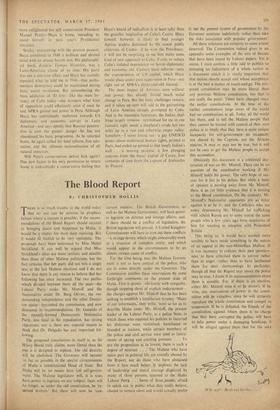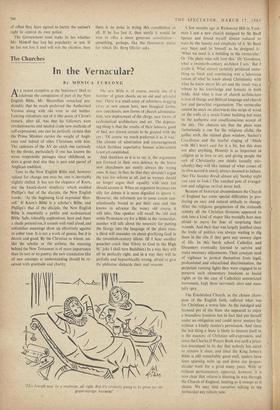The Blood Report
By CHRISTOPHER HOLLIS
rrHERE is so much trouble in the world today I that no one can be anxious to prophesy failure where a success is possible; if the recom- mendations of the Blood Report should succeed ii, bringing peace and happiness to Malta, it would be a matter for most deep rejoicing. But it would be foolish to be very optimistic. The proposals have been welcomed by Miss Mabel Strickland. It can well be argued that Miss Strickland's ideas are more realistic and sensible than those of other Maltese politicians. but the fact remains that her party did not win a single seat at the last Maltese elections and I do not know that there is any reason to believe that her following has since increased. The two parties which divided between them all the seats—the Labour Party under Mr. Mintoff and the Nationalists under Dr. Borg Olivier, the one demanding independence and the other Domin- ion status-----boycotted the commission, and now denounce its recommendations. Dr. Ganaldo of the recently-formed Democratic Nationalist Party, less total in his repudiation, has strong objections; nor is there any especial reason to think that Dr. Delgado has any important fol- lowing.
The proposed constitution in itself is, as Sir Hilary Blood truly claims, more liberal than the one it is designed to replace. The old dyarchy will be abolished. The Governor will become 'as far as possible in the special circumstances of Malta a constitutional Head of State.' But Malta will by no means have full self-govern- ment. The Maltese legislature will, it is true, have power to legislate on any subject; there will no longer, as under the old constitution, be 're- served matters.' But there will now be 'con-
current matters.' The British Government, as well as the Maltese Government. will have power to legislate on defence and foreign affairs; and. if there should he a conflict of legislation, the British legislation will prevail. A United Kingdom Commissioner will have to iron out these conflicts --a strange device, which might conceivably work in a situation of complete amity, and which would appear in the circumstances to be an almost certain cause of conflict.
For the time being, too, the Maltese Govern- ment is not to have control of the police, who are to come directly under the Governor. The Commission justifies these reservations by some forthright comments on the present state of Malta. First it quotes—obviously with sympathy. though stopping short of explicit endorsement- the charges against Mr. Mintoff that he has been seeking to establish a totalitarian tyranny. 'Many of our informants,' they write. 'went so far as to describe Malta under Mr. Mintoff, the present leader of the Labour Party, as a police State, in which those who opposed his policies or incurred his disfavour were victimised. humiliated or branded as traitors, while certain members of the police and civil service were used as instru- ments of spying and exerting pressure. . . . To put the proposition at its lowest, there is such a degree of mistrust. . . .' The Maltese who have taken part in political life are roundly abused by the Report, nor do those who have abstained from it fare much better. It 'deplores the lack of leadership and moral courage displayed by many of those persons opposed to the Malta Labour Party.. .. Some of those,people, afraid to speak out in public what they really believe. choose to remain silent and would actually prefer Jo see the present system of government by the Governor continue indefinitely rather than take the risks associated with popular government.' All these strictures are certainly to some extent deserved. The Commission indeed gives in an appendix some examples of the sort of threats that have been issued by Labour papers. Yet it seems, I must confess, a little odd to publish so sweeping an indictment of a whole nation in a document which it is vitally important that that nation should accept and whose acceptance is at the best a matter of touch-and-go. The pro- posed constitution may be more liberal than any previous Maltese constitution, but that is not really the point. Times have changed since the earlier constitutions. At the time of the earlier constitutions large areas of the world had no constitutions at all. Today all the world has them, and to tell the Maltese people that they cannot be trusted with control of their own police is to imply that they have a quite unique incapacity for self-government—an incapacity not shared by the Cypriots. nor the African nations. It may or may not be true, but it will not be easy to get the Maltese people to accept this accusation.
Obviously this document is a confessed dec- laration of war on Mr. Mintoff. There can be no question of the constitution working if Mr. Mintoff holds his power. The only hope of suc- cess for it lies in his defeat. But while a body of opinion is turning away from Mr. Minton, there, is as yet little evidence that it is turning to the Blood constitution. On the contrary, Mr. Mintotrs Nationalist opponents arc as bitter against it as he is; and the Catholics who arc
today denouncing Mr. Mintoff for trafficking with atheist Russia are to some extent the same people who' a few years ago were suspicious of him for wanting to integrate with Protestant Britain.
This being so. it would have seemed more sensible to have made something in the nature of an appeal to the non-Mintoffian Maltese. If it was necessary to criticise their past spineless- ness, to have criticised them in sorrow rather than in anger - rather than to have lambasted them for their shortcomings. In particular, though all that the Report says about the police may be true, I doubt if its recommendation about them is sensible. For, if there is an election, either Mr. Mintoll wins it or be doesn't. If he wins, any reservations of power in the consti- tution will be valueless, since he will certainly repudiate the whole constitution and compel its suspension. If he is defeated, the friends of the constitution, against whom there is no charge that they have corrupted the police, will have
to take power under a damaging handicap; it will he alleged against them that for the sake 'Why nor' cot bectle.s. . . of office they have agreed to barter the nation's right to control its own police.
The Government must make its bet whether Mr. Mintoff has lost his popularity or not. If he has not lost it and will win the election, then there is no point in trying this constitution at all. If he has lost it, then surely it would be wise to offer a more generous constitution-- something, perhaps, like the Dominion status for which Dr. Borg Olivier asks.







































 Previous page
Previous page